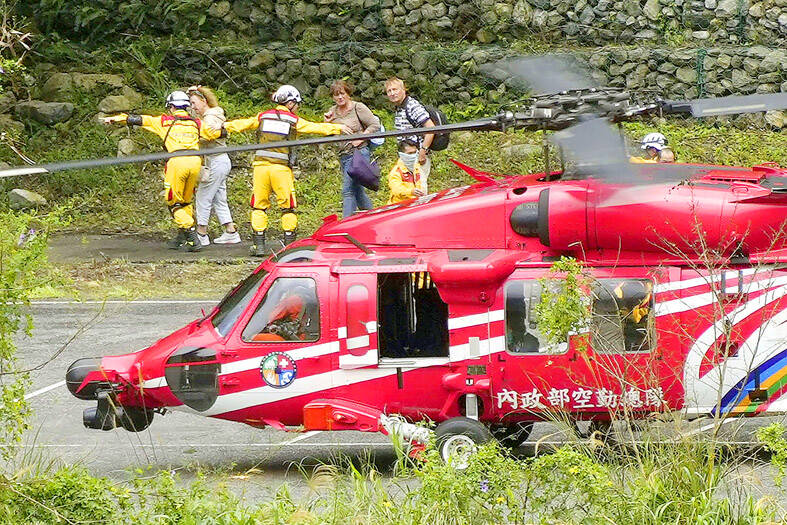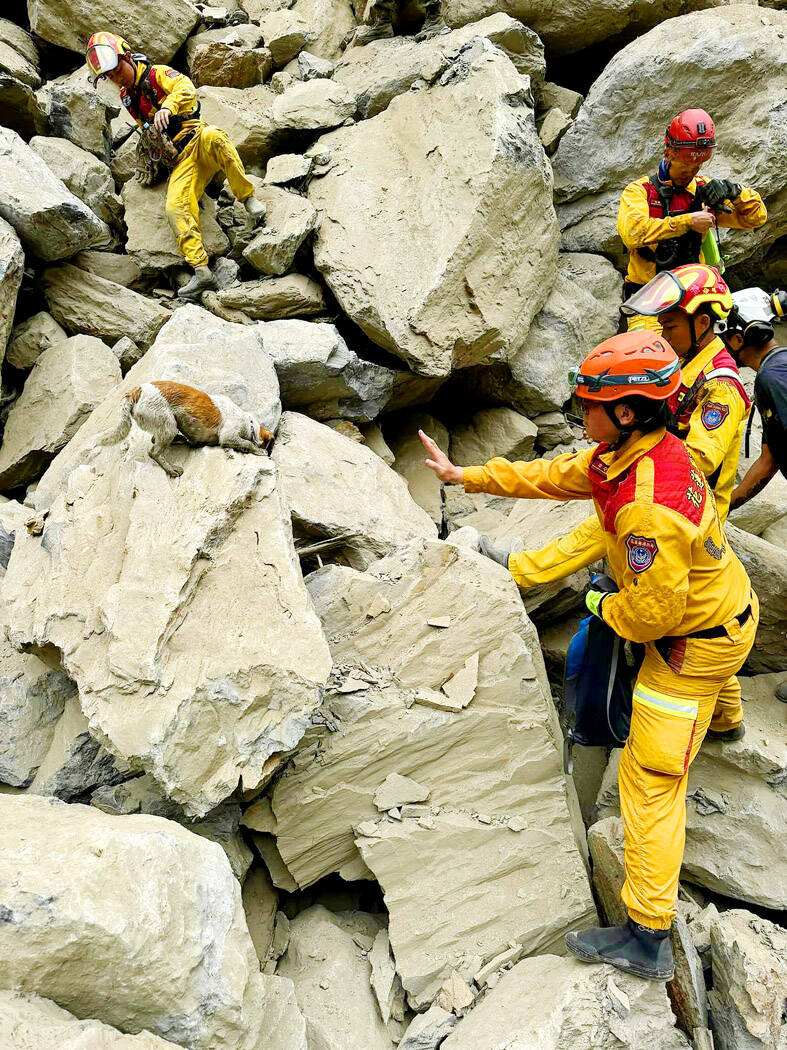The number of people confirmed dead after Wednesday’s massive earthquake has risen to 13 following the discovery of a woman in Hualien County yesterday and the confirmation of two bodies found on Friday, the Central Emergency Operations Center said, as rescuers continued to airlift trapped people in Hualien County.
The three deceased were among six people reported missing on Taroko National Park’s Shakadang Trail (砂卡礑).
The body of a 21-year-old woman surnamed Hu (胡), who traveled to Hualien alone, was found at the 0.5km mark on the trail at about 11am yesterday. An identification card was found on her body.

Photo: Suo Takekuma, Kyodo News via AP
It was earlier believed that the body could be that of another woman, who, along with her husband, surnamed Yu (游), and three children, were on the trail at the time of the quake.
Rescue personnel found the two other bodies on the trail on Friday, but they were not included in the official death toll until yesterday.
Yu’s mother said they were her son and 11-year-old granddaughter, but they have not been formally identified.

Photo courtesy of the Hualien Fire Department
Yu’s wife, eight-year-old son and five-year-old daughter could be buried more than 25m below the trail, rescue personnel said, adding that aftershocks and inclement weather have affected the rescue mission.
As of 2:30pm yesterday, 13 people had died and 1,145 were injured in the earthquake, while 405 were trapped or stranded and six were missing, data released by the center showed.
As of 10am — 74 hours after the temblor, which measured 7.2 on the Richter scale and magnitude 7.4 on the moment magnitude scale — the Central Weather Administration had recorded 603 aftershocks, including 23 that were magnitude 5 or greater.
The aftershocks have loosened earth, causing rocks to continue falling intermittently.
Demolition of a building in Hualien City that was leaning precariously after the quake was also halted, because of aftershocks that caused it to lean further.
Meanwhile, National Airborne Service Corps helicopters flew to areas that had been cut off near Taroko National Park to airlift stranded people.
“Priority was given to the elderly, the weak, women, children and people with chronic diseases,” news Web site ET Today reported. “Although everyone was tired after coming down the mountain, they were all still smiling.”
One airlift brought people from the luxury Silks Place Taroko (太魯閣晶英酒店) hotel, where more than 400 tourists and staff had been stranded.
Rescuers also airdropped boxes of food and supplies to a group of students, teachers and residents at an inaccessible elementary school.
Elsewhere, engineers were working around the clock to clear massive boulders from roads and tunnel entrances.
Minister of the Interior Lin Yu-chang (林右昌) said that Taiwan would bolster its rescue operations by working with a team of experts from Turkey.
Seven Turkish rescuers arrived in Taiwan last night and brought with them drone technology to assist in the rescue efforts due to the challenging terrain in the area, said Lin, who also heads the Central Emergency Operation Center.
Other than the drones, local rescue capabilities and resources are plentiful, he said, adding that the Turkish team is the only foreign rescue team Taiwan has accepted technical assistance from.

CHAOS: Iranians took to the streets playing celebratory music after reports of Khamenei’s death on Saturday, while mourners also gathered in Tehran yesterday Iranian Supreme Leader Ayatollah Ali Khamenei was killed in a major attack on Iran launched by Israel and the US, throwing the future of the Islamic republic into doubt and raising the risk of regional instability. Iranian state television and the state-run IRNA news agency announced the 86-year-old’s death early yesterday. US President Donald Trump said it gave Iranians their “greatest chance” to “take back” their country. The announcements came after a joint US and Israeli aerial bombardment that targeted Iranian military and governmental sites. Trump said the “heavy and pinpoint bombing” would continue through the week or as long

TRUST: The KMT said it respected the US’ timing and considerations, and hoped it would continue to honor its commitments to helping Taiwan bolster its defenses and deterrence US President Donald Trump is delaying a multibillion-dollar arms sale to Taiwan to ensure his visit to Beijing is successful, a New York Times report said. The weapons sales package has stalled in the US Department of State, the report said, citing US officials it did not identify. The White House has told agencies not to push forward ahead of Trump’s meeting with Chinese President Xi Jinping (習近平), it said. The two last month held a phone call to discuss trade and geopolitical flashpoints ahead of the summit. Xi raised the Taiwan issue and urged the US to handle arms sales to

BIG SPENDERS: Foreign investors bought the most Taiwan equities since 2005, signaling confidence that an AI boom would continue to benefit chipmakers Taiwan Semiconductor Manufacturing Co’s (TSMC, 台積電) market capitalization swelled to US$2 trillion for the first time following a 4.25 percent rally in its American depositary receipts (ADR) overnight, putting the world’s biggest contract chipmaker sixth on the list of the world’s biggest companies by market capitalization, just behind Amazon.com Inc. The site CompaniesMarketcap.com ranked TSMC ahead of Saudi Aramco and Meta Platforms Inc. The Taiwanese company’s ADRs on Tuesday surged to US$385.75 on the New York Stock Exchange, as strong demand for artificial intelligence (AI) applications led to chip supply constraints and boost revenue growth to record-breaking levels. Each TSMC ADR represents

State-run CPC Corp, Taiwan (CPC, 台灣中油) yesterday said that it had confirmed on Saturday night with its liquefied natural gas (LNG) and crude oil suppliers that shipments are proceeding as scheduled and that domestic supplies remain unaffected. The CPC yesterday announced the gasoline and diesel prices will rise by NT$0.2 and NT$0.4 per liter, respectively, starting Monday, citing Middle East tensions and blizzards in the eastern United States. CPC also iterated it has been reducing the proportion of crude oil imports from the Middle East and diversifying its supply sources in the past few years in response to geopolitical risks, expanding